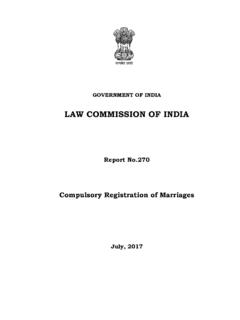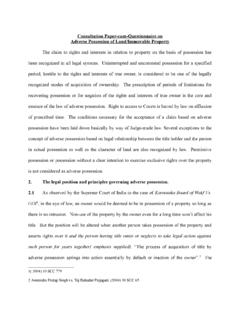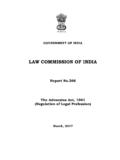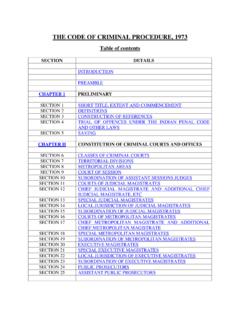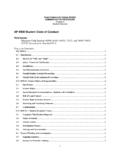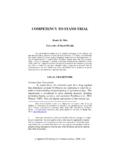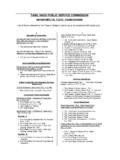Transcription of LAW COMMISSION OF INDIA
1 GOVERNMENT OF INDIA LAW COMMISSION OF INDIA Report The criminal Law (Amendment) Bill, 2017 (Provisions dealing with Food Adulteration) January, 2017 ii iii iv Report The criminal Law (Amendment) Bill, 2017 (Provisions dealing with Food Adulteration) Table of Contents Chapter Title Page I Background 1-3 II Judgement of the Supreme Court 4 III Reference of the Proposal 5 IV Present Framework governing Food Safety Regulation 6-18 A Food Safety and Standards Act, 2006 6 B Food Adulteration and the Indian Penal Code 9 C Certain words and expressions defined only in the Food Act 11 V Proportionality of Punishments in Sections 272 and 273 of the IPC 19-33 VI Incoherency in Laws 34-37 Annexure A Comparative Statement showing the changes proposed in the IPC and CrPC 38-44 Part-I Amendments suggested in IPC 38-41 Part-II Amendments suggested in CrPC 42-44 B The criminal Law (Amendment)
2 Bill, 2017 45-50 1 CHAPTER-I Background Our increasing daily need and fast growing lifestyle has resulted in availability of innumerable food and food products in the market, instant food and instant cooking has become a common requirement in every household today. Regional to multinational brands of food and food products are expanding their markets day by day; and are welcomed at homes on the note of instant servings for our needs. Various processes along the way transform and modify the food product so as to enhance or customize its characteristics.
3 This is an inexorable process linked to the increased specialisation of functions in society and cannot be reversed. Securing the wholesome food for human consumption has since long been secured through laws. Food legislations are brought into place to ensure that the acceptable minimum level of food safety is ensured; and the standards that secure such safety are strictly enforced. The ever growing food and food products market bring along with it, the greed of antisocial persons engaged in food adulteration, which is a serious crime against society.
4 The increasing menace of food adulteration in the country is driving the citizens to health hazards that ultimately result in various ailments and even premature deaths. The Law COMMISSION s Report is to address such threats and covers two provisions in the Indian Penal Code 1860 (hereinafter referred to as the IPC) that deal with food adulteration: Sections 272 and 273. As this Report will briefly explain, the present framework on food safety which is enshrined in the Food Safety and Standards Act, 2006 (hereinafter referred to as the Food Act); where the food 2 adulteration is dealt with under the provisions of the Act by creating an offence relating to unsafe food and creating a basis for standard-setting in the industry.
5 The object of this Report is to create a uniform scheme of punishment for food adulteration offences. Most significantly, the suggested amendments aims at eliminating the low quantum of punishment provided in the IPC; and updates it to bring it in line with the provisions of the Food Act as well as the punishments as found in the amendments of the IPC made by Odisha, Uttar Pradesh and West Bengal. Appropriate amendments to the relevant Schedule of the criminal Procedure Code are also proposed. These proposals are appended at the end of the Report as an Amendment Bill.
6 It is necessary to present the events briefly that resulted in this project being taken up by the Law COMMISSION . The Supreme Court judgement in Swami Achyutanand Tirth & Ors. v. Union of INDIA & and the Ministry of Home Affairs reference are brought into focus to explain the objective with which the COMMISSION undertook this study. This Report precisely provides a description of the current framework on food safety laws in INDIA and how they have changed, not too long ago to meet the increasing demands of food regulations keeping in view the best practices followed in the world all over.
7 This will contextualize the IPC provisions and show/reflect the importance of the proposed changes. This role is made clear in the section immediately following the discussion on the relation between the IPC and food adulteration. 1 AIR 2016 SC 3626. 3 Certain alternative proposal is presented in relation with the incoherent nature of those two sections and this is followed by a justification for the proposed application of the principle of proportionality in the punishments.
8 In a perspective, the Report is aimed at removing perceived incoherency and reinforcing the deterrent intent behind our food safety laws. 4 CHAPTER-II Judgement of the Supreme Court 2. While dealing with a writ petition filed in public interest highlighting the menace of growing sales of adulterated and synthetic milk in different parts of the country and the inability of concerned State Governments and the Union to take effective measures for combating the adulteration of milk with hazardous substances, the Supreme Court (supra) directed the Central Government to come up with suitable amendments in the Food Act and the IPC.
9 Reiterating its stance in its orders dated and , the Court highlighted that, it was desirable to make penal provisions of IPC at par with the provisions contained in the State Amendments made by Odisha, Uttar Pradesh and West Bengal, wherein the punishment for adulteration of food and products is enhanced to imprisonment for life and also fine .2 Further, it suggested that it was desirable if the Union of INDIA revisits the Food Act, revise the punishment for adulteration making it more deterrent in cases where the adulterant can have adverse impact on health.
10 2 Paragraph 19 of the Judgment. 5 CHAPTER-III Reference of the Proposal 3. The Law COMMISSION of INDIA has received from Ministry of Home Affairs, a letter dated making reference of the Supreme Court Judgement in Swami Achyutanand Tirth & Ors. (supra) requested the Law COMMISSION to examine the specific issue of amending penal provisions as contained in sections 272 and 273 of IPC at par with the State Amendments made in sections 272 and 273 by the States of Odisha, Uttar Pradesh and West Bengal.



